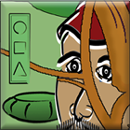On The Way: The Daily Zen Journal
Bloodstream Sermon, Part 2
Bodhidharma (440-528)

To find a buddha, all you have to do is see your nature. Your nature is buddha. And the buddha is the person who’s free, free of plans, free of cares. If you don’t see your nature and run around all day looking somewhere else, you’ll never find a buddha. The truth is, there’s nothing to find.
Life and death are important. Don’t suffer them in vain. There’s no advantage in deceiving yourself. Even if you have mountains of jewels and as many servants as there are grains of sand along the Ganges, you see them when your eyes are open. But what about when your eyes are shut? You should realize that everything you see is like a dream or illusion.
If you don’t find a teacher soon, you’ll live this life in vain. It’s true, you have the buddha-nature, but without the help of a teacher, you’ll never know it. Only one person in a million becomes enlightened without a teacher’s help.
If, though, by the conjunction of conditions, someone understands what the Buddha meant, that person doesn’t need to find a teacher. Such a person has a natural awareness superior to anything taught. But unless you’re so blessed, study hard, and by means of instruction you’ll understand.
People who don’t understand and think they can do so without study are no different from those deluded souls who can’t tell white from black. Falsely proclaiming the Buddhadharma, such persons in fact blaspheme the Buddha and subvert the Dharma.

They preach as if they were bringing rain. But theirs is the preaching of devils, not of buddhas. Deluded people who follow such instruction unwittingly sink deeper in the Sea of Birth and Death.
Whoever sees his nature is a buddha, whoever doesn’t is a mortal. If you can find your buddha-nature apart from your mortal nature, where is it? Our mortal nature is our buddha-nature. Beyond this nature there’s no buddha. The buddha is our nature. There’s no buddha besides this nature. And there’s no nature besides the buddha.
Unless they see their nature, how can people call themselves buddhas?
Q: But suppose I don’t see my nature, can’t I still attain enlightenment by invoking buddhas, reciting sutras, making offerings, observing precepts, practicing devotions, or doing good works?
A: No, you can’t.

Q: Why not?
A: If you attain anything at all, it’s conditional; it’s karmic. It results in retribution. It turns the Wheel, and as long as you’re subject to birth and death, you’ll never attain enlightenment. To attain enlightenment, you have to see your nature. Unless you see your nature, all this talk about cause and effect is nonsense.
Buddhas don’t practice nonsense. A buddha is free of karma, free of cause and effect. To say he attains anything is to slander a buddha. What could he possibly attain?
Even focusing on a mind, a power, an understanding, or a view is impossible for a buddha. A buddha isn’t one-sided. The nature of their mind is basically empty, neither pure nor impure. They’re free of practice and realization. They’re free of cause and effect.

A buddha doesn’t observe precepts. A buddha doesn’t do good or evil. A buddha isn’t energetic or lazy. A buddha is someone who does nothing, someone who can’t even focus their mind on a buddha. A buddha isn’t a buddha.
Don’t think about buddhas. If you don’t see what I’m talking about, you’ll never know your own mind.
Bodhidharma (440-528)
Excerpted from The Zen Teaching of Bodhidharma translated by Red Pine (1987)





This reading may leave you with a sense of nothing to hold onto. It is full of spiritual paradox. On the one hand:
If you don’t find a teacher soon, you’ll live this life in vain. It’s true, you have the buddha-nature, but without the help of a teacher, you’ll never know it. Only one person in a million becomes enlightened without a teacher’s help.
And not too much later:
If, though, by the conjunction of conditions, someone understands what the Buddha meant, that person doesn’t need to find a teacher. Such a person has a natural awareness superior to anything taught.
And then there is the challenge of finding a teacher. Here Bodhidharma warns his listeners about people who proclaim they are teachers, perhaps even letting you think they may be enlightened, to legitimize their position:
Falsely proclaiming the Buddha-dharma, such persons in fact blaspheme the Buddha and subvert the Dharma.
Of course not all teachers fall into that trap, but we have to use our own “wisdom eye” to help us steer in life.
Where does that leave us? Recognizing that teaching in itself has pitfalls for the teacher and the students, if one can keep one’s lights on, this is still a widely accepted way to practice. Just as the Buddha taught many different ways according to the audience he was teaching, there are many different styles of teaching today also.
Usually it is a good place to start, however, it is wise to be ready to train on one’s own eventually. Too often in group practice one relies on the energy of the group itself and the teacher to carry one along the Way.
When one decides to practice on one’s own, one of the biggest challenges is how to avoid fooling oneself. How do you call yourself back when you get caught up or attached?
There is a great anecdote from the Mumonkan that illustrates one master’s attempt to do just this:
Zuigan Gen Osho called to himself every day, “Master!” and answered:
“Yes, sir!”
Then he would say, “Be wide awake!” and answer,
“Yes, sir!”
“Henceforward, never be deceived by others!”
“Yes, sir!”
“No, I won’t.”
Heading clearly forward with you,
Elana, Scribe for Daily Zen